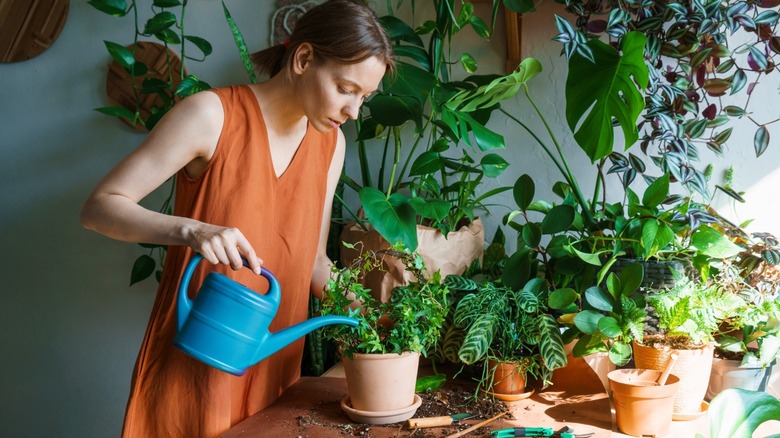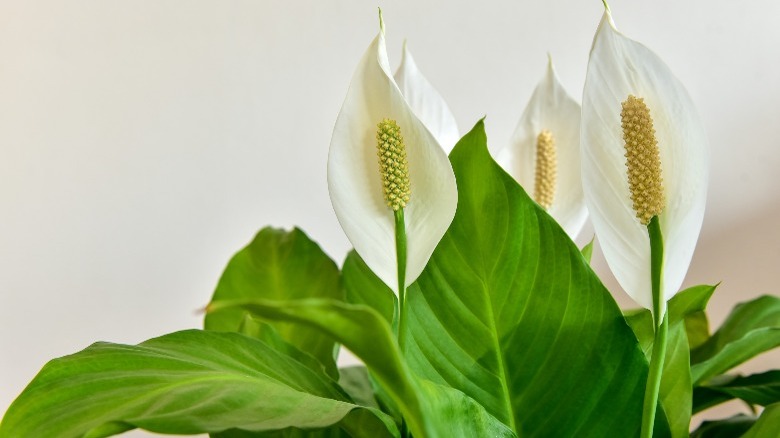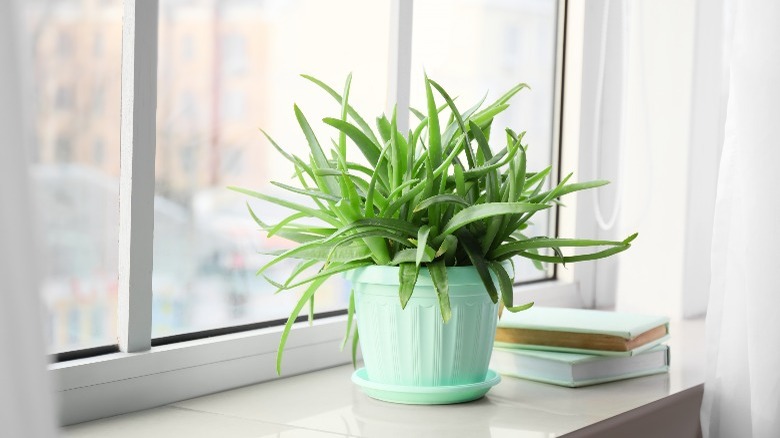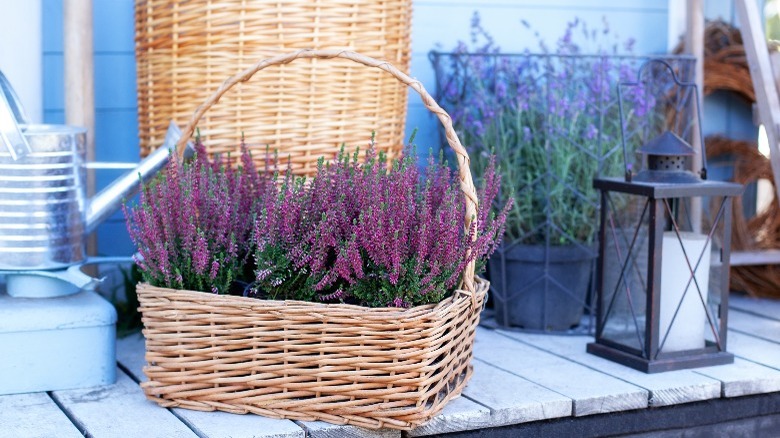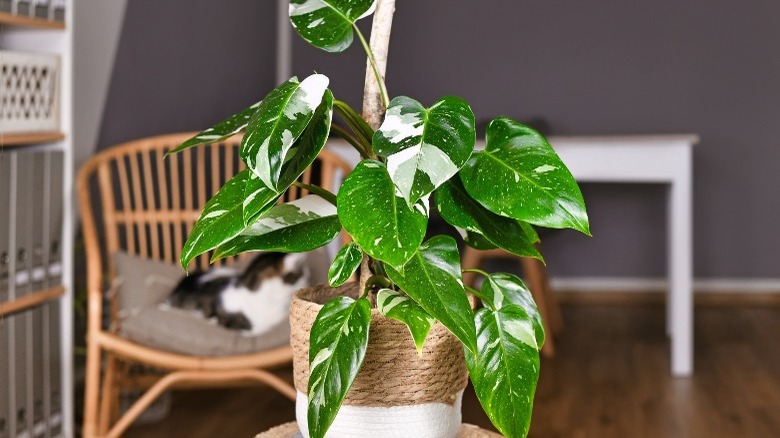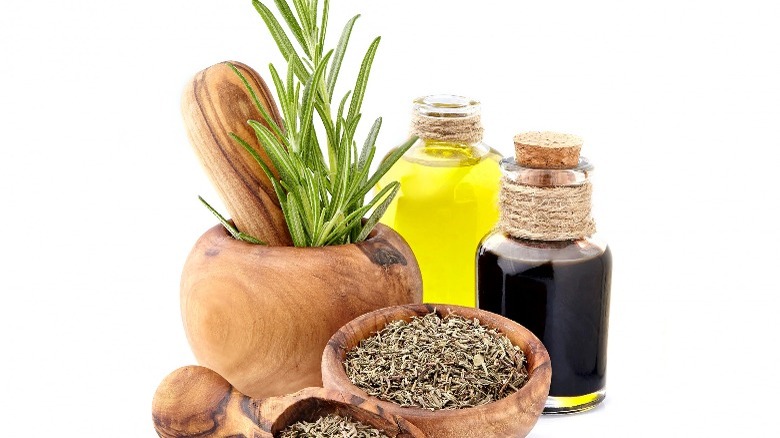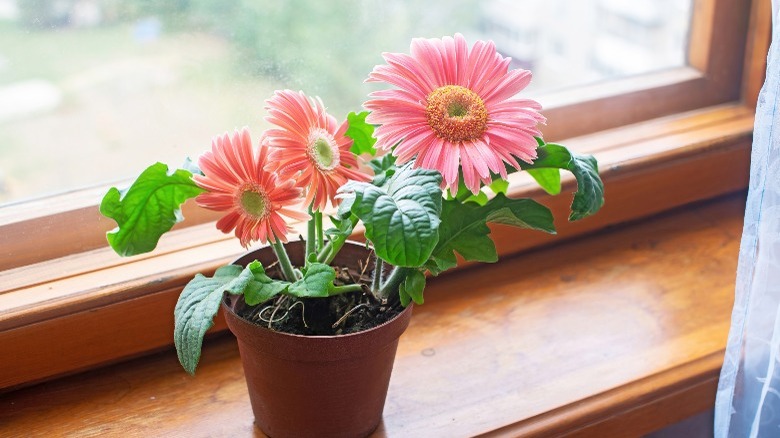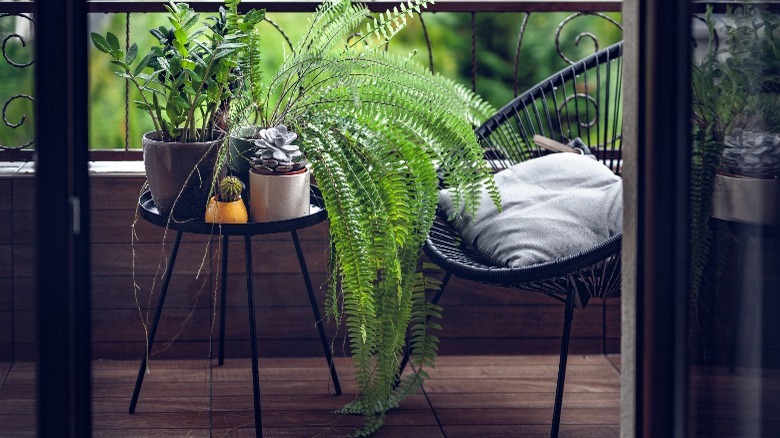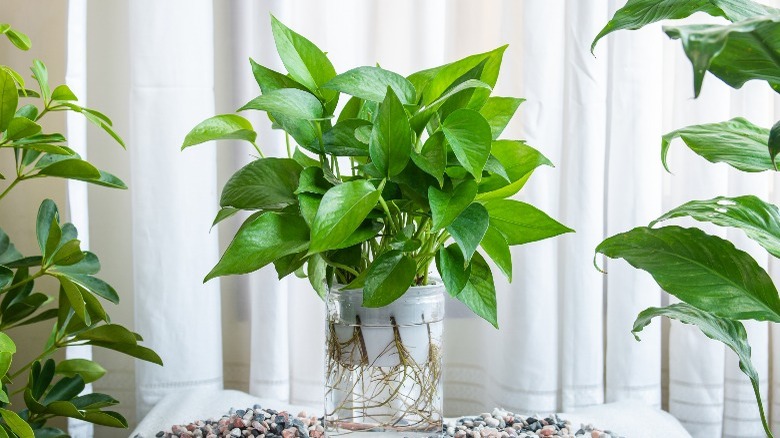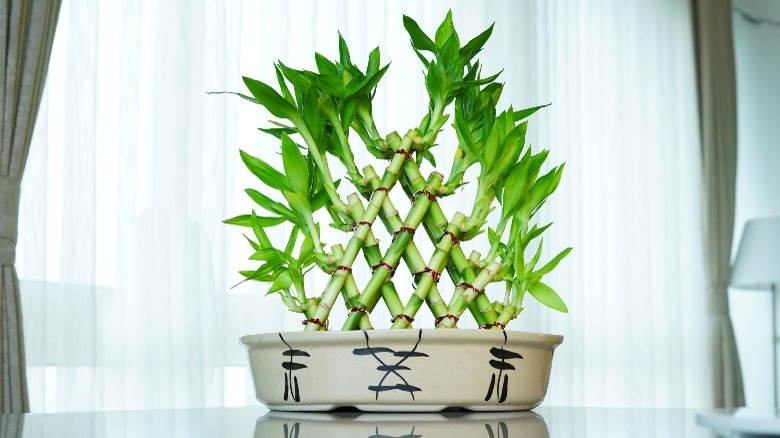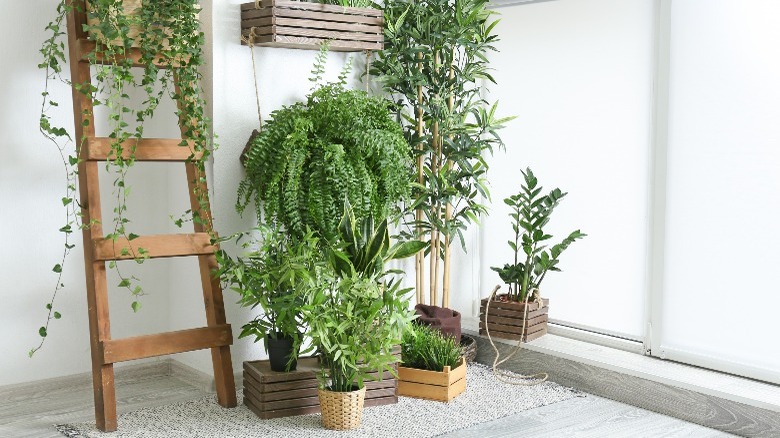The Best Houseplants That Work To Improve Your Mood
With the weather clearly changing and growing colder, you might be feeling a slight depression. According to Psychology Today, this mood shift that affects many people around this time of year is known as seasonal affective disorder or SAD. But even if you don't suffer from seasonal blues, we can all benefit from having houseplants, and there are certain varieties that have more health benefits than others. A study reported in ScienceDirect measured the effects of urban household gardening on mental health. They found this activity to be one of the top five things participants could do to improve their mental well-being.
Additionally, multiple other health benefits are experienced by people who have indoor houseplants (via MDPI). Research shows that indoor plants have a positive effect on human functions, including improving cognition and blood pressure levels. This same study showed that simply being in the presence of houseplants can improve mental and physical health. In fact, spending just 15 minutes around indoor foliage can be enough to feel happier, calmer, and more peaceful (via The Washington Post). Additionally, being around plants helps to lower anxiety, sharpen your focus or concentration, and brighten your mood. So if you're trying to choose the right houseplants to transform the energy in your home, here are some terrific ideas.
Peace lily
This one is a crowd favorite, and peace lilies are truly a beautiful way to start your indoor plant collection. The Week points out that peace lilies are low maintenance, and one of the main benefits that they provide is air purification. These amazing, lush plants absorb 60% of pollutants such as carbon monoxide and formaldehyde. They can also remove harmful vapors like acetone and alcohol from the air. Peace lilies produce beautiful white flowers, only need indirect sunlight, and can thrive with very little water and are a great plant for the bedroom as they can promote more restful sleep. Peace lilies add a bit of moisture to the air as well, which can be necessary indoors, especially in dry winter months. Another great idea is putting a peace lily in the bathroom, as it can absorb moisture and in turn help prevent mildew from forming on tile or grout.
With this same function, this pretty foliage can remove mold spores from the air! Removing mold spores is an essential benefit because many people are allergic or sensitive to them. Peace lilies also make great home office or living room plants, as they remove radiation from computers and television that can be harmful over time. Florgeous explains that the peace lily symbolizes peace and prosperity, as well as tranquility, purification, and good fortune. Spiritually, peace lilies are known to bring wisdom, inner peace, and harmony. This popular houseplant has come to be known as a symbol of inner healing, and to propagate feelings of happiness and well-being, making them ideal for gifting. This plant definitely earns its spot as a way to boost your mood, as well as your air quality!
Aloe vera
Most of us have heard of aloe vera, the miracle plant with seemingly endless health benefits. Medical News Today points out there are many uses for aloe vera such as applying the gel topically, drinking the juice, and even using the juice as mouthwash. The plant is easy to grow indoors or out but is ideal as a houseplant that can improve your health in multiple ways. Aloe vera has thick leaves that store water in them, and if you break one in half you can use the gel inside topically, for sunburns, diaper rash, and other skin irritations. The gel contains helpful ingredients like vitamins and antioxidants — and may even help prevent wrinkles!
Additionally, aloe vera can fight bacteria and slow the spread of viruses. It's been found to accelerate healing and using 100% aloe vera juice as mouthwash reduces dental plaque. The National Center for Complementary and Integrative Health adds that aloe vera may be good for skin conditions like acne, herpes, and psoriasis.
OutofStress explains the symbolism of aloe vera embodies feminine energy, good luck, cleansing, and immortality. It is a unique plant in that if you break off a leaf, it can heal itself and grow the leaf back. Aloe vera is used to ward off evil energy, as the plant is believed to absorb it from the environment. If you place aloe vera plants around the entrance to your home, it is believed to protect it from negativity. It is also said to uplift your personal energy and vibration along with reducing stress and anxiety. This makes this spiky variety an ideal plant for boosting your mood!
Lavender
Lavender is a wonderful choice for a houseplant that smells heavenly as well. According to Medical News Today, lavender has many skin and beauty uses and is widely used in the form of essential oil made from the plant. Additionally, lavender can assist in the healing of bites or minor burns and reduce inflammation. Lavender is also used to ease pain caused by headaches and toothaches. Emerging research is indicating that the antifungal properties of lavender oil may be effective at combating infections. It's important to note that lavender essential oil is toxic if ingested, although the plant itself is not. In fact, there are lavender products that are even made for ingesting, such as capsules or tea.
Two Peas In A Condo says growing lavender is easy indoors, especially over the fall and winter months as it's low-maintenance and is an ideal plant for containers. Plus, the dried flowers are perfect to make your own potpourri. They can also be used to make relaxing bath bombs and soaps. In the kitchen, you can sprinkle lavender on dishes as a unique garnish or use them to add floral flavor to dishes and drinks — just think, lavender lemon mimosas!
The fragrant flowers signify purity and grace (via Petal Talk). They also invoke feelings of calmness and devotion. Spiritually, lavender is connected to the energy center of the crown chakra thanks to the lovely purple hue of the flowers. Thanks to these features, this delicate blooming plant is high on our list of mood-boosting specimens.
Philodendron
If you're interested in a bigger indoor plant that gives you lush, green leaves and the feeling of being in a tropical jungle, philodendron might be a good choice. But there are lots of varieties of philodendron, some with smaller foliage than others. Balcony Garden Web points out that this plant filters toxins and pollutants from your home while adding oxygen, improving air quality, and allowing you to breathe easier. Philodendron is easy to grow indoors because it requires only indirect sunlight and has low watering needs. It also doesn't require a ton of maintenance like tedious pruning or annual repotting. If you'd like to avoid using soil in your home, this plant can thrive when it's grown in just a container of water.
Petal Republic adds that along with being a terrific air purifier, the plant helps to relieve stress and promote better productivity. Additionally, if you practice feng shui, these versatile plants are a must to add to your home. Not only do they represent health and wealth, but they are also known to promote positive yang energy. Philodendron plants have served as an inspiration to creative minds and many famous artists (via The Joy of Plants). In fact, the foliage is part of Picasso's sculpture, "Woman in the Garden." Add one of these potted beauties to your home to boost your own imagination!
Rosemary
Rosemary makes a great indoor plant that's also a tasty herb you can grow yourself. According to Horticulture, growing rosemary indoors requires a ton of sunlight so make sure to put it in the brightest window possible. You might even have to supplement this herb with artificial light, especially if you notice it looking dull or droopy. You only need to water it when the top inch of soil is dry, and note that in winter months, the growth slows, so don't panic.
Additionally, according to Intrepid Mental Wellness, there are multiple benefits of the rosemary plant in addition to its delightful culinary offerings. The oil derived from the plant is touted for relieving common stomach problems and easing pain and inflammation. The aroma of the oil can help relieve stress and anxiety, improve memory and alertness, and improve respiratory issues. Furthermore, rosemary essential oil is good for your skin and has antimicrobial qualities.
The member of the mint family's name is based on its intricate flowers and their role in the story of the Virgin Mary fleeing from Egypt (via Natufia). Rosemary also has some interesting symbolic traits and has been associated with both fairies and witches and has been used for mourning at funerals. The herbal sprigs have even been woven into wreaths and worn as symbols of fidelity by brides throughout history.
Gerbera daisy
If you've seen these vibrant blooms, the color is so vivid they almost look ethereal. Feeling down? Jolly Farmer points out that the Gerbera Daisy represents cheer so add one to your space to brighten your day. Thanks to its charm, the bloom is actually in the top five most popular flowers in the world! It's no surprise they're a terrific mood elevator if grown inside, as they're absolutely gorgeous and come in a variety of vivid colors. Additionally, they're great indoor air purifiers. They can efficiently remove common pollutants like formaldehyde and benzene from your home.
According to Sunday Gardener, growing Gerbera Daisies indoors is fairly simple, just make sure they get plenty of sunlight, about three to five hours daily, during their growing season from spring to fall. Then, in the winter, you can be less attentive to the plant's needs and simply make sure it has indirect sunlight. These plants love environments around 70 degrees, just about normal room temperatures. Watch for signs of the plant drying out and water when necessary, usually about every three to five days.
The meaning of the Gerbera Daisy depends on the color of the blooms (via FNP). Orange Gerbera Daisies symbolize enthusiasm while purple ones symbolize feminine elegance. Yellow Gerberas represent happy vibes and the vitality of youth and make great gifts to bring a jolt of energy to the recipient. Pink Gerbera Daisies signify admiration and white ones symbolize appreciation, making them thoughtful ideas for congratulations or thank-you gifts. No matter the color, these beautiful flowers will lift the spirits in any room.
ZZ plant
Petal Republic explains that the ZZ plants are known to require very little maintenance while touting some great health benefits too. Beginning indoor gardeners who struggle with growing may want to try ZZ plants, as they can survive with little water and very low sunlight. However, if you have kids or pets, you might want to skip the ZZ plant. It contains calcium oxalate crystals, which means they can be poisonous to humans and animals. So you'll also want to wear gloves when handling this plant. On the bright side, the plant helps purify the air by helping to remove indoor toxins and pollutants. It can filter everything from chemical contaminants to carbon dioxide to provide you with cleaner and more breathable indoor air.
There are also some powerful meanings behind ZZ plants. The plant symbolizes wealth and prosperity and is believed by some to attract money and good fortune. It's also a symbol of persistence. In fact, the plant has been around for possibly millions of years and is known as a type of living fossil. The ZZ plant is linked to wealth, and is therefore perfect in the home office of an ambitious entrepreneur — or anyone else who wants to attract money! This plant is big in feng shui, and any plant that brings good fortune is sure to improve your mood!
Pothos plant
Next on our list is the pothos plant, a low-maintenance houseplant with multiple benefits, according to Balcony Garden Web. Some of the advantages include that it can survive in no direct sunlight. This means that it does well indoors, with either indirect sunlight, artificial light, or in low light situations. It is a climbing or trailing plant, meaning it can be trained to grow just about any way you want it to, making it an ideal decorative plant. Pothos removes pollutants inside the house, such as benzene found in common pollutants like car exhausts. It can also help filter formaldehyde and carbon monoxide from your breathing air.
There are many different types of pothos like marble queen and snow queen that feature white variegation. If you are looking for a solid-colored option, both neon and jade varieties of the plant are un-variegated (via Petal Republic). Pothos is another feng shui plant, said to bring good luck and cleanse negative energy. They're believed to instead encourage positive energy and prosperity, making them a terrific plant to boost your mood. Pothos are sometimes even called the money plant, and additionally symbolize perseverance when facing adversity. This makes it a fantastic plant for a trauma survivor, to support someone in recovery, or as a good luck housewarming gift. If you're looking for a gorgeous decorative plant that transforms your space beautifully, a pothos is perfect!
Dieffenbachia (dumb cane, lucky bamboo)
Balcony Garden Web explains that the dieffenbachia plant, commonly known as dumb cane, is a helpful air-purifying plant that is especially effective at reducing carbon monoxide. It can also filter out toluene, a toxin that is known to cause tiredness, weakness, and even organ damage. Combined with proper ventilation, dieffenbachia and its air-filtering counterparts can help you breathe easier in your space.
It's also another low-maintenance plant that can survive with only indirect sunlight and can even thrive in total shade. It's one of the easiest plants to grow, especially if you're a home gardener that tends to forget waterings. In fact, you should allow the topsoil to dry out completely between waterings.
Arkansas Democrat-Gazette points out that dieffenbachia, also known as lucky bamboo, is a great feng shui specimen. It is said to attract happiness, and what could be more uplifting than that? It's not really a type of bamboo plant but does resemble one in appearance. It's believed that you can group these plants by stalks for different types of luck. For example, group three stalks together if you wish for happiness! Five stalks can be grouped together when you want to attract prosperity, while seven stalks can be grouped for healthy vibes. This is a fun plant to display in just the right number for the mood and outcome you're looking for!
Ferns
Ferns are one of the most recognizable houseplants around. As All Things Nature points out, ferns are easy to maintain and can thrive in small homes while improving air quality. Like other purifying plants, ferns remove toxins from the air and inject refreshing oxygen. So, hang one in a corner of your office for a natural air filter, or set one near your bed to help you breathe easier at night.
Symbolism and Metaphor explains that there are many legends surrounding ferns including some tied to love and wealth. Fern leaves have even been touted for protecting people throughout folklore from evil magic and dark spirits. Additionally, ferns can represent security and confidence, and the bond between two lovers. There are thousands of species of ferns, including red, blue, and silver varieties, so finding the perfect one for your space is simple. They can be grown in indirect sunlight or artificial light and love humid conditions best (via MasterClass). Because of this, ferns make excellent bathroom hanging plants. And what can boost your mood more than by being greeted by your cheerful plant as you get ready for the day?
